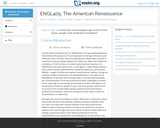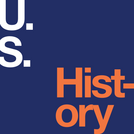
The ĺÎĺ_ĺĚĄ_American Renaissance,ĺÎĺ_ĺĚĺÎĺ a period of tremendous literary activity that took place in America between the 1830s and 1860s represents the cultivation of a distinctively American literature. The student will begin this course by looking at what it was in American culture and society that led to the dramatic outburst of literary creativity in this era. The student will then explore some of the periodĺÎĺ_ĺĚĺ_s most famous works, attempting to define the emerging American identity represented in this literature. Upon successful completion of this course, the student will be able to: discriminate among the key economic, technological, social, and cultural transformations underpinning the American Renaissance; define the transformations in American Protestantism exemplified by the second Great Awakening and transcendentalism; list the key tenets of transcendentalism and relate them to romanticism more broadly and to social and cultural developments in the antebellum United States; analyze EmersonĺÎĺ_ĺĚĺ_s place in defining transcendentalism and his key differences from other transcendentalists; analyze competing conceptualizations of poetry and its construction and purpose, with particular attention to Poe, Emerson, and Whitman; define the formal innovations of Dickinson and their relationship to her central themes; describe the emergence of the short story as a form, with reference to specific stories by Hawthorne and Poe; distinguish among forms of the novel, with reference to specific works by Hawthorne, Thompson, and Fern; analyze the ways that writers such as Melville, Brownson, Davis, and Thoreau saw industrialization and capitalism as a threat to U. S. society; develop the relationship between ThoreauĺÎĺ_ĺĚĺ_s interest in nature and his political commitments and compare and contrast his thinking with Emerson and other transcendentalists; analyze the different ways that sentimentalism constrained and empowered women writers to critique gender conventions, with reference to specific works by writers such as Fern, Alcott, and Stowe; define the ways that the slavery question influenced major texts and major controversies over literature during this period. This free course may be completed online at any time. (English Literature 405)
- Subject:
- Arts and Humanities
- Literature
- Material Type:
- Assessment
- Full Course
- Homework/Assignment
- Reading
- Syllabus
- Provider:
- The Saylor Foundation
- Date Added:
- 03/06/2019





